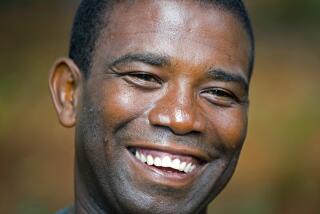Haiti’s truth teller
- Share via
“The Agronomist” is a wonderful gift in a plain brown wrapper, an unexpectedly moving and exciting story that’s arrived with a most ordinary title and a subject matter not likely to make heartbeats quicken.
It almost seems an act of magic that an unapologetically political film that closely examines the last decades of Haiti’s history could move us so much, both to sadness and to joy. Even the participation of Oscar-winning filmmaker Jonathan Demme as director, co-producer and cameraman doesn’t fully explain how and why this 90-minute documentary turned out to be so compelling.
To understand that you have to see the film and experience firsthand the personal dynamism of its subject, the remarkable Jean Dominique, an irrepressible force, a true hero for our complex times and a martyr gunned down by unknown thugs in 2000.
Though he never took to a stage, Dominique was a great actor in the best sense, in the way he enlarged lives. A spellbinding talker of irresistible passion and palpable charisma, he intoxicates us with his eloquence and his fervor no matter what the subject. By the time his wife and collaborator Michele Montas says “fire radiated from him; he stole it from Prometheus,” it doesn’t sound hyperbolic, it sounds like the simple truth.
Dominique did start out to be an agronomist, and though he became celebrated as a journalist, Demme’s title is meant to emphasize the man’s lifelong attachment to the soil of Haiti and his dreams for the peasants who cultivate it, his determination to have government work as much for outsiders as those on the inside.
As the owner of his country’s oldest broadcasting station, Radio Haiti Inter, Dominique from 1968 on became a pro-democracy zealot, indomitable in his determination to bring freedom to dictator-run Haiti. Often threatened, his motto was “you can’t kill the truth, you can’t kill justice, you can’t kill what we’re fighting for.” The truth, he added, “will always make the devil’s face blush.”
“The Agronomist” is especially relevant now, and not only because, with the recent U.S.-facilitated departure of President Jean-Bertrand Aristide, Haiti is once again in the news, balanced on the edge of chaos with the outcome far from certain.
Demme’s documentary is also significant because at a time when attempts are being made to start a democratic movement in Iraq from scratch, it shows how difficult that is and, frankly, how regularly, at least where Haiti is concerned, our government has been complicit in the survival of corrupt regimes when it suited our geopolitical agenda to do so.
Demme (who directed three previous documentaries on Haiti and used Haitian musicians Wyclef Jean and Jerry “Wonder” Duplessis to do the film’s seductive score) did the bulk of the interviewing for “The Agronomist” in the early 1990s, during the last days of Dominique’s second period of exile in the United States.
A quarter of a century earlier, having previously run afoul of the “Papa Doc” Duvalier dictatorship both as an agronomist and a cinephile who exhibited foreign films to open “a window to a world of civilization, light and freedom,” Dominique took not the last of the many risks of his life by buying Radio Haiti.
At that time, he explained, radio in Haiti was not a news medium but strictly an entertainment one. Inch by inch, Dominique changed that. With his wife as his partner, he introduced Creole, the only language most of the local people understood, to the air. And he introduced programming, from sound portraits of a voodoo festival to news about the troubles of absolute rulers like Somoza of Nicaragua and the shah of Iran, that subversively encouraged listeners to question the status quo at home.
Not surprisingly, Dominique was an early partisan of Aristide’s presidential aspirations, and footage of Aristide making fiery speeches both as a priest and as president shows what a hypnotic speaker he is. When he insists, “we are not underdeveloped, the United States is underdeveloped in the human sense,” it’s easy to understand why Washington has had no regrets over the coup that ousted him.
Yet it is characteristic of how uncompromising a force for truth Dominique was that he dared to break with a president who represented his dreams when he felt Aristide’s regime was edging toward corruption.
That was the kind of principled stand that caused an estimated 60,000 people to mob the Port-au-Prince airport when Dominique returned from his first exile in 1986, and that makes his death so unbearable. Director Demme has done other potent and meaningful films, but “The Agronomist” defers to none of them in its effectiveness and its power.
*
‘The Agronomist’
MPAA rating: PG-13, for some violent images and brief nudity.
Times guidelines: Scenes of violence and voodoo rituals.
A Clinica Estetico presentation in association with HBO/Cinemax Documentary Films, released by Thinkfilm. Director Jonathan Demme. Producers Demme, Peter Saraf, Bevin McNamara. Executive producer Daniel Wolff. Cinematographers Aboudja, Demme, Peter Saraf, Bevin McNamara. Editors Liz Gelber, Bevin McNamara. Music Wyclef Jean, Jerry “Wonder” Duplessis. Running time: 1 hour, 30 minutes.
In limited release.
More to Read
Only good movies
Get the Indie Focus newsletter, Mark Olsen's weekly guide to the world of cinema.
You may occasionally receive promotional content from the Los Angeles Times.











